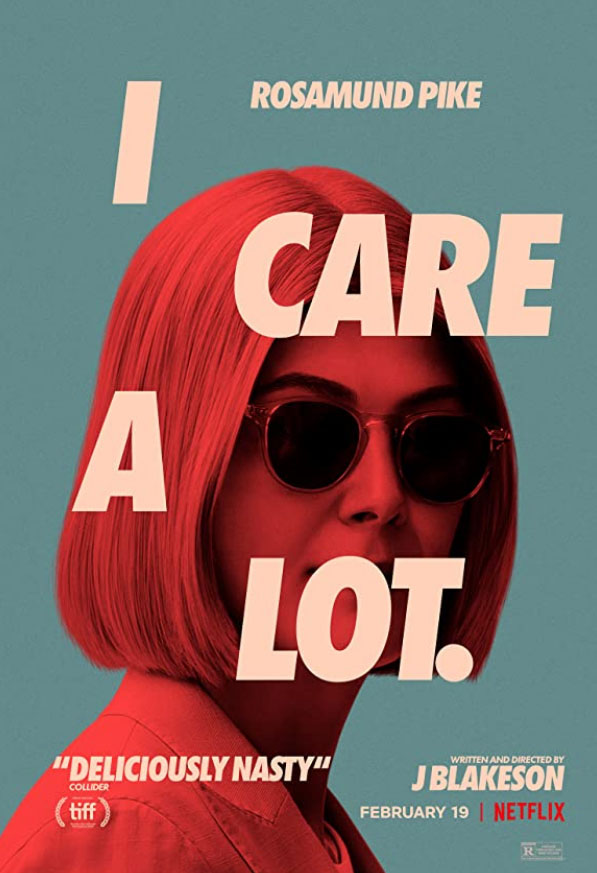There’s a scene in the second hour of “I Care A Lot” where unrepentant awful person Marla Grayson is threatened with death. It’s not the first such threat, but it’s the first one that seems immediately actionable. Her response is noncommittal. She offers a quip and a shrug, essentially dismissing the threat of death as marginal. Who cares about death? Not Marla. This moment is instructive. By this point, the film has veered through a number of varying iterations of itself. It’s played around with social satire, petty-legal drama, comedy of (no) manners, and something like a nasty social fable. By this point, it’s veering into something of a crime-dramaesque-comedy. I’ll admit, the swerves up to this point had already strained my credulity but that precise moment of indifference in the face of death was the moment of complete disengagement. Because, if Marla is that ambivalent about her own fate – why should we care what happens to her?
Marla, played with arch precision by Rosamund Pike, is a guardian by profession but a grifter and con-artist by spirit. When we meet her in Massachusetts, she has settled on a good grift where she convinces the courts to grant her guardianship of the elderly, after which she places them in care-homes and sells of their homes and assets for a profit. Few care about the elderly, and the few that do can easily be dealt with.
The latest mark is Jennifer Peterson (Dianne Wiest playing the closest thing to a human figure in the film) – an elderly woman with no family. Jennifer is fine on her own but Marla manages to gain custody of her in quick and easy ways. But the situation gets complicated when Marla discovers some hidden gems in her possession, and things begin to really take off when Jennifer’s relationship with members of the Russian mob surface. From there, “I Care A Lot” finds itself careening to a certain clash between forces as various terrible people face-off against each other.
It’s not a mark of great inventiveness or unusualness that “I Care A Lot” is filled with despicable people. At every turn, J Blakeson’s (alleged) comedy emphasises the ways that each character we come to meet is hardly pleasant. Marla is the most aggressively the worst, though, and Blakeson, who writes and directs the film, is fascinated with her awfulness – presenting the worst of her impulses with relish. Fascination with awful people is not unusual for film, but “I Care A Lot” struggles in establishing where it wants to be. Marla is more of an idea than a full-blooded person. She is a hazy idea of the worst of American greed and capitalism fashioned into a blonde titan with stiletto heels and the smartest wardrobe. Rosamund Pike’s work is obviously riffing on her earlier work in “Gone Girl”, except the mercurial Amy Dunne was operating in service of something more clearly specific that Marla here. Pike is good here, but the more “I Care A Lot” goes on the more we find the actors making the most out of these broadly drawn characters, uncertain of what the ultimate point is.
And that part cannot be overemphasised. The cast in this is doing the work. Beyond Pike’s Golden-Globe nominated turn, the entire cast is doing committed work. Wiest as the unsuspecting victim of Marla’s ruse is best in show, mostly because she’s playing Jennifer in a very specific register that resists the film’s later inclinations to make the film into something Very Profound and Important. She also disappears from the screen when the film becomes tiresome in the final third. Beyond Wiest, Peter Dinklage is dependably enjoyable as a Russian mobster, Isiah Whitlock Jr. is dependably frustrating as one of the worst judges in recent cinema, and Chris Messina is incredibly suave in a much too brief-turn as a charming lawyer. Each cast member here seems to have gotten the message on what characters they are playing. What they haven’t gotten is any clear indication of what the film is working towards.
The film hasn’t gotten that note, either. By the half-way point, and there’s a moment where the film suddenly veers into another version of itself that you can pinpoint really specifically, I found myself wondering what all this good acting was in service of. Pike is doing her best to make Marla’s turn from irredeemable villain, to criminal savant, to aspirational lesbian to cynical antihero work but at every turn “I Care A Lot” fails to establish one key thing. What exactly is it trying to communicate? The less specific, and bigger, it goes then the more specious it gets, so that by the time the film closes on a great repudiation of American capitalism and its greedy fantasies, the entire thing, which feels like it should pack a neat punch, just feels incredibly dull.
The sunny, slick cinematography that has marked so much of the digitisation of cinema in the last few years does not help. “I Care A Lot” often looks too generically slick to register as specific enough to linger in your memory. Sure, these people are awful. But, so what? Who can really care too much about their specific fates when they are so ambivalent about themselves as they are about each other? For all the nastiness the characters do, Blakeson still feels unwilling to truly examine the specificity of any one person’s awfulness and instead couches it all in some point about American being awful. Potentially apt, but ultimately unilluminating. When it all ends, the characters have long ceased being people and are merely placeholders for ideas about venality, and greed and capitalism. The elderly that Marla has outwitted are as forgotten in the film with as much regard as Marla gives them. But who really cares anyway? Not this film.
I Care A Lot is available for streaming on Netflix, and on Prime Video in some territories.





